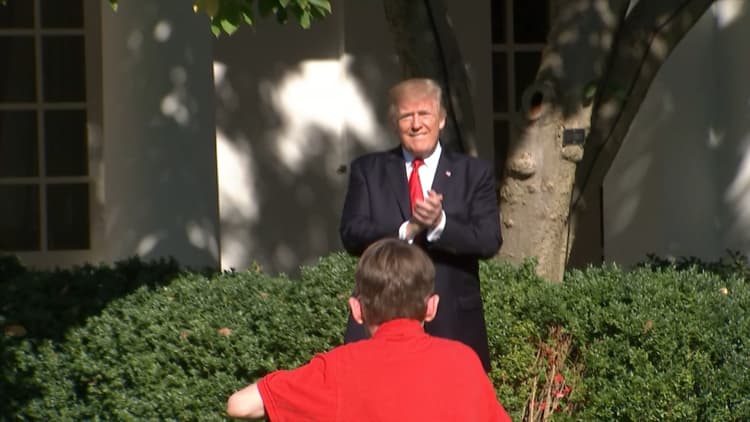The White House on Monday rolled out a proposed $4.8 trillion budget that earmarked $1 billion toward increasing affordable child care options for American families.
President Donald Trump's proposed fiscal 2021 budget aims to cut down funding for many social programs, including Medicare and Medicaid. But amid the cuts, the Trump administration included a one-time, $1 billion investment to build out a more robust supply of child care options, including programs sponsored by employers.
Monday's 2021 budget also maintains funding for Head Start and the Child Care and Development Block Grant at the Department of Health and Human Services.
Spending $1 billion on child care may sound like a lot, but it's only about a 4.5% increase in federal funding. Public spending to fund early child care and education is about $34 billion, with the federal government kicking in about $22.2 billion and state and local municipalities spending about $11.8 billion, according to the most recent data progressive think tank Economic Policy Institute sourced from the Organization for Economic Co-operation and Development in 2017.
"It's always good to see more money going into early child care," says Simon Workman, director of early childhood policy at the liberal leaning Center for American Progress. But that $1 billion in proposed funding is not anywhere near sufficient to fix the child care crisis we have right now, he says, including solving issues around affordability, supply of providers and an underfunded workforce of teachers and daycare employees.
"There are so many problems right now, $1 billion is a drop in the bucket," Workman says.
This is not the first time President Trump has allocated funds for child care. His 2020 budget earmarked $1 billion to increase affordable child care options in underserved communities across the U.S. Additionally, Trump signed off on a $2.4 billion funding increase for the Child Care and Development Fund last year. Under the program, states have access to a collective $8.1 billion to help fund child care options for low-income families.
The White House aims to build up the supply of providers by giving funding to a wide range of child care facilities, including faith-based and family child care providers, as well as offering support in the form of small business and entrepreneurship opportunities.
Monday's budget follows his Feb. 4 State of the Union address, in which he promised to support "America's moms and dads" through increased child care options, paid family leave and child tax credits.
"I have also overseen historic funding increases for high-quality child care, enabling 17 states to serve more children, many of which have reduced or eliminated their waitlists altogether," Trump said on Feb. 4., adding that he has sent Congress a "plan with a vision to further expand access to high-quality child care and urge you to act immediately."
Parents bearing the brunt of child care costs
Over the past 15 years, the number of child care providers in the U.S. has dropped by 30%, according to the Department of Health and Human Services. Home-based providers have been hit particularly hard, with about half closing up shop.
The drop in providers, in part, has made it difficult for many Americans to find affordable options, with many parents forced into more expensive child care or a stay-at-home situation. American families with young children spend an average of $6,000 out-of-pocket annually, or about $500 a month, on child care and early education. On average, maternal labor force participation is 3% lower in child care deserts than communities with adequate options, a 2018 report from the Center for American Progress found.
"Families are the biggest payer of early child care expenses in this country," Workman says, adding that many are cobbling together a "patchwork of care" using child care providers, family and reduced hours at work. "They're making it work, but facing a lot of stress," he says.
Many of the Democratic presidential candidates also support initiatives to make child care more affordable. Senators Elizabeth Warren (D-Mass.) and Bernie Sanders (I-Vt.) both support universal care, with Warren introducing a bill last summer that aimed to spend $70 billion to create federally funded, but locally run child care centers nationwide and cap spending on child care at 7% of Americans' annual household income.
Pete Buttigieg, the former mayor of South Bend, Ind., has similarly proposed spending $700 billion over the next decade on child care and education. Former Vice President Joe Biden has not released a detailed plan, but has expressed support for universal pre-kindergarten programs.
Don't miss: Parents are spending $42 billion on early child care — that's more than federal and state spending combined
Like this story? Subscribe to CNBC Make It on YouTube!



